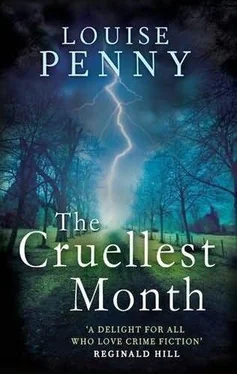Louise Penny - Cruelest Month
Здесь есть возможность читать онлайн «Louise Penny - Cruelest Month» весь текст электронной книги совершенно бесплатно (целиком полную версию без сокращений). В некоторых случаях можно слушать аудио, скачать через торрент в формате fb2 и присутствует краткое содержание. Жанр: Старинная литература. Описание произведения, (предисловие) а так же отзывы посетителей доступны на портале библиотеки ЛибКат.
- Название:Cruelest Month
- Автор:
- Жанр:
- Год:неизвестен
- ISBN:нет данных
- Рейтинг книги:3 / 5. Голосов: 1
-
Избранное:Добавить в избранное
- Отзывы:
-
Ваша оценка:
- 60
- 1
- 2
- 3
- 4
- 5
Cruelest Month: краткое содержание, описание и аннотация
Предлагаем к чтению аннотацию, описание, краткое содержание или предисловие (зависит от того, что написал сам автор книги «Cruelest Month»). Если вы не нашли необходимую информацию о книге — напишите в комментариях, мы постараемся отыскать её.
Cruelest Month — читать онлайн бесплатно полную книгу (весь текст) целиком
Ниже представлен текст книги, разбитый по страницам. Система сохранения места последней прочитанной страницы, позволяет с удобством читать онлайн бесплатно книгу «Cruelest Month», без необходимости каждый раз заново искать на чём Вы остановились. Поставьте закладку, и сможете в любой момент перейти на страницу, на которой закончили чтение.
Интервал:
Закладка:
Robert Lemieux had been charged with assault and attempted murder. He faced a long prison sentence. But Armand Gamache couldn’t bring himself to lay charges against Michel Brébeuf. He knew he should. Knew he was a coward for backing away. But every time he approached Paget’s office to lay the charge he remembered little Michel Brébeuf’s hand on his arm. Telling him in his little boy voice it would be all right. He wasn’t alone.
And he couldn’t do it. His friend had saved him once. And now it was his turn.
But Michel Brébeuf had resigned from the Sûreté, a broken man. His house for sale, he and Catherine were leaving their beloved Montreal and all they knew and loved. Michel Brébeuf had placed himself beyond the pale.
Armand Gamache was invited to take tea with Agent Nichol and her family one Saturday afternoon. He pulled up to the house, tiny and immaculate. He could see the faces at the picture window overlooking the road, though they disappeared as he came up the walk. The door was opened even before he knocked.
He met Yvette Nichol for the first time. The person, not the agent. She was dressed in simple slacks and a sweater, and he realized it was also the first time he’d seen her without a stain on her clothing. Ari Nikolev, small and thin and worried, wiped his palms on his pants then held his hand out.
‘Welcome to our home,’ he said in broken French.
‘It’s an honor,’ said Gamache, in Czech. Both men must have spent the morning practicing the other’s language.
The next hour was taken up with a cacophony of relatives shouting at each other in languages Gamache couldn’t even begin to recognize. One old aunt, he was sure, was creating it as she went along.
The food kept coming, the beverages. Then the songs. It was a joyous, even riotous, event. And yet, every time he looked for Nichol he found her standing just outside the living room. Finally he approached her.
‘Why don’t you come in?’
‘I’m fine here, sir.’
He watched her for a moment. ‘What is it? Do you ever go in?’ he asked in amazement, standing next to her on the threshold.
She shook her head. ‘I’ve never been invited.’
‘But it’s your own home.’
‘They’ve taken all the places. There’s no room.’
‘How old are you?’
‘Twenty-six,’ came the sullen reply.
‘Time you made your own place. Insist. It’s not their fault you’re standing here, Yvette.’
Still she hesitated. The truth was, it was comfortable there. Cold, lonely sometimes, but comfortable. What the hell did he know? Everything was easy for him. He wasn’t a girl, he wasn’t an immigrant, his mother hadn’t died young, he wasn’t mocked by his own family. He wasn’t a lowly agent. He’d never understand how hard it was for her.
As Gamache left, full of sweet cakes and strong tea, he asked Yvette Nichol to walk him to his car.
‘I want to thank you for what you did. I know how painful it is to deliberately put yourself outside the group.’
‘I’m always outside,’ she said.
‘Time to come in, I think. I believe this is yours.’
He reached into his pocket and pressed something into her hand. Opening it she found a warm stone.
‘Thank you,’ he said.
Nichol nodded.
‘Do you know, in the Jewish faith when someone dies, loved ones put stones on top of the grave marker. I gave you a piece of advice a year or so ago, when we first discussed the Arnot case. Do you remember it?’
Nichol pretended to think, but she remembered clearly.
‘You said I should bury my dead.’
Gamache opened his car door.
‘Consider it.’ He nodded to the stone in her hand. ‘But just make sure they’re really dead before you bury them otherwise you’ll never get rid of them.’
As he drove away he thought, maybe, he should take his own advice.
Armand Gamache ascended to the top floor of Sûreté headquarters, walking along the corridor to the impressive wooden door. He knocked, hoping no one was in.
‘Come in.’
Gamache opened the door and stood before Sylvain Francoeur. The Superintendent didn’t move. He stared at Gamache with undisguised loathing. Gamache reached into his pants pocket, instinctively looking for the charm he’d carried most of his life. But his pocket was empty. A week ago he’d placed his father’s dented and damaged crucifix in a simple white envelope with a little note, and given it to his son.
‘What do you want?’
‘I want to apologize. I was wrong to accuse you of spreading stories about my family. You didn’t do it. I’m sorry.’
Francoeur’s eyes narrowed, waiting for the ‘but’. None came. ‘I’m prepared to write an apology and send it to all the members of the council who were there.’
‘I’d like you to resign.’
They stared at each other. Then Gamache smiled wearily. ‘Is this going to be it for the rest of our lives? You threaten, I retaliate? I accuse, you demand? Do we really need to do this?’
‘I’ve seen nothing to change my opinion of you, Chief Inspector. Including how you’ve handled this. Superintendent Brébeuf was a far better officer than you’ll ever be. And now, thanks to you, he’s gone too. I know you, Gamache.’ Francoeur stood and leaned over his desk. ‘You’re arrogant and stupid. Weak. You rely on instinct. You never even saw that your best friend was working against you. Where was your instinct then? The brilliant Gamache, the hero of the Arnot case. Blind. You’re blinded by your emotions, by your need to help people, to save them. You’ve brought nothing but disgrace on the force from the moment you got into a leadership position. And now you come sucking up. It’s not over, Gamache. It’ll never be over.’
The word splashed into Gamache’s face, no longer smiling. He stared at Francoeur, who was trembling with rage. Gamache nodded then turned and left. Some things, he knew, refused to die.
A few days later the Gamaches, including Henri, were invited to a party in Three Pines. It was a sunny spring day, the young leaves in full bloom and turning the trees every shade of fresh green. As they bumped and thumped along the dirt road, the canopy of lime green overhead shining like the stained glass in St Thomas’s, they noticed unusual activity off to one side. Though they couldn’t quite see it yet, Gamache knew it was at the old Hadley house and wondered if the villagers were finally tearing it down. A man stepped into the center of the road and waved them to the side. Monsieur Béliveau, in overalls and a painter’s cap, was smiling.
‘ Bon. We all hoped you’d come.’ The grocer leaned into the open window, patting Henri who’d climbed over Gamache to see who was there so that it appeared a dog was driving the car. Gamache opened the door and Henri bounced out to great yells of recognition from villagers who hadn’t seen him since he was a puppy.
Within minutes Reine-Marie was up a ladder, scraping flaking paint from the old house, and Gamache was scraping trim around ground floor windows. He didn’t like heights and Reine-Marie didn’t like trim.
As he scraped he had the impression the house was moaning, as Henri did when he rubbed his ears. With pleasure. Years of decay, years of neglect, of sorrow, were being scraped away. It was being taken down to its real self, the layers of artifice removed. Had that been the moaning all along? Had the old house been moaning for pleasure when company finally arrived? And they’d thought it sinister?
Far from tearing it down, the villagers of Three Pines had decided to give the old Hadley house another chance. They were restoring it to life.
Already the place seemed to preen in the sun, shining where the new paint had been applied. Teams were installing new windows and others were cleaning inside.
Читать дальшеИнтервал:
Закладка:
Похожие книги на «Cruelest Month»
Представляем Вашему вниманию похожие книги на «Cruelest Month» списком для выбора. Мы отобрали схожую по названию и смыслу литературу в надежде предоставить читателям больше вариантов отыскать новые, интересные, ещё непрочитанные произведения.
Обсуждение, отзывы о книге «Cruelest Month» и просто собственные мнения читателей. Оставьте ваши комментарии, напишите, что Вы думаете о произведении, его смысле или главных героях. Укажите что конкретно понравилось, а что нет, и почему Вы так считаете.











